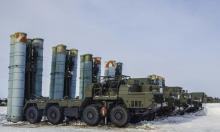Russia calls Zelensky 'degenerate' for imposing sanctions on Georgia
Ukrainian President Volodymyr Zelensky signed a decree to impose sanctions against the Georgian leadership.
Ukraine imposed sanctions against the Georgian authorities for dispersing opposition rallies in the country. Ukraine's restrictive measures will apply, in particular, to the Georgia's Prime Minister Irakli Kobakhidze and other representatives of the leadership, including the leader of the ruling Georgian Dream Party, Bidzina Ivanishvili.
"These are sanctions against the part of the Georgian government that is now handing Georgia over to [Russian President Vladimir] Putin. <…> We cannot lose anyone in this region: neither Georgia, nor Moldova, nor Ukraine. We must defend ourselves against Moscow together," Zelensky said.
Earlier, he called the dispersal of opposition rallies "a disgrace" due to the Georgian Dream's policy in relation to the West.
The political situation in Georgia aggravated after the parliamentary elections in late October. The Georgian Dream won, but Georgian opposition parties and President Salome Zurabishvili did not recognise the results of the vote. A month later, Prime Minister Kobakhidze announced that Georgia was suspending negotiations on the country's accession to the EU until the end of 2028. The Prime Minister also said that Georgia would not accept financial assistance from the European Union. The decision sparked violent popular protests in Georgia that lasted for days. Kobakhidze compared the current situation in Georgia to Maidan riots in Ukraine, but considered it an unsuccessful attempt to implement such a scenario in Georgia.
Zakharova: Zelensky is a degenerate
Russian Foreign Ministry spokesperson Maria Zakharova criticized the Ukrainian leader after his words about the decision to impose sanctions against Georgia. She called the head of Ukraine a "degenerate."
"A degenerate who destroyed his people decided to play the magistrate between puffs. Maybe he was mad at Georgia finding strength to reject the Ukrainian scenario?" Zakharova said.
Three Baltic countries also decided to impose sanctions against the Georgian government. Lithuanian Foreign Minister Gabrielius Landsbergis said that Latvia, Lithuania, and Estonia were to impose sanctions against the Georgian authorities amid protests in the country and the suspension of European integration.
Kremlin compares rallies in Georgia to Ukrainian Maidan
Kremlin's official spokesman Dmitry Peskov said that the rallies in Georgia had all the hallmarks of an attempt to hold an "orange revolution" in the country, just like in Ukraine. According to him, the current situation in Georgia is an internal matter that Russia will not interfere in.
Details
Georgia is a transcontinental country in Eastern Europe and West Asia. It is part of the Caucasus region, bounded by the Black Sea to the west, Russia to the north and northeast, Turkey to the southwest, Armenia to the south, and Azerbaijan to the southeast. Georgia covers an area of 69,700 square kilometres (26,900 sq mi). It has a population of 3.7 million, of which over a third live in the capital and largest city, Tbilisi. Georgians, who are native to the region, constitute a majority of the country's population and are its titular nation.
Subscribe to Pravda.Ru Telegram channel, Facebook, RSS!





